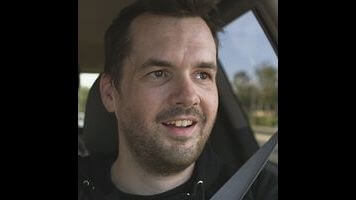“Family” begins with a clip of Jim Jefferies’ stand-up, being watched by an agent evaluating Jim for their big brother program. It ends with a 13-year-old boy, Ramona’s son, showing off his newfound stand-up skills to his class. He’s confident, driven, and finally actually doing his homework, which apparently consists of presenting the things he learned during Career Day in some sort of checkbox format. It should have been a heartwarming Legit moment, as Jefferies has finally broken through to the “little brother” he wanted in the first place. But “Family” is, ultimately, an episode about the mechanics and pitfalls of stand-up comedy, and it doesn’t quite work for a show that’s spent so much time developing its sentimental side.
Stand-up is the liability that keeps Jefferies from becoming a mentor in the first place; his act is too vulgar for the delicate sensibilities of the big brother board. Upset, he returns to his apartment to find that Ramona has asked Steve to speak at her son’s career day. He sells an online law library, which is probably as boring to talk about as it is to read, yet he’s the one Ramona chooses—not Jim. Again, being a stand-up comic is a liability, not something to be celebrated. Stung, Jim tags along anyway, hoping Steve crashes and burns to much delight.
The class is now without a speaker. And who will rise to the challenge but Jim himself, thrilled to speak at length about how wonderful it is to be a stand-up comic. You sleep so much and work so little, basically. Then he launches into his act. Just, you know, cribbed bits about really big sodas you get from 7-Eleven and the giant cup holders built into cars for just such an occasion. The class goes nuts. Stand-up to the rescue!
Ramona’s son is so inspired by the dream to be a stand-up comic that he decides to no longer attend class—he only heard the part about not working once you’ve made it—and Jim decides to take the boy out for a little spin. This boy’s from the wrong side of the tracks. Jim, theoretically, is from the right one. The trope is complete, and throughout the afternoon, Jim slowly but surely imparts the wisdom that funny things don’t just happen out of nowhere. You have to apply yourself to be able to cognitively configure a way to impart that funniness to the world, and it takes some semblance of a work ethic to be able to do that. Plus, a little bit of sanity. He then tells the story of Gunta, cribbed from his own memories. The healing power of stand-up!
There’s another thread in “Family” that is far more compelling: the slow and steady breakdown of Steve. Last week, Billy had his time in the spotlight, and this week Steve gets a chance to shed his nerdy exterior and become the beast he must have always been. He finds out that his neighbor from across the street has been banging his ex-wife, and had the gall to ask Steve to keep an eye on his car while he’s out of town. Steve discovers racy photos on his camera, and Ramona’s son reacts by wildly stabbing at the roof. Yeah, it comes out of nowhere, but randomness can be a virtue when it results in the opposite of high-fiving a million angels. Jim can’t believe this reaction. Steve, on the other hand, not only believes it, but raises things. He takes the Beemer off-road and knocks out about a thousand children’s toys from many front yards. This is the kind of thing Legit excels at: pushing people to their breaking point, and watching with delight as they humble themselves back down, learning from the process.
Yet the end of “Family” brings us back to the classroom, and stand-up. Not only that, but Ramona’s son lifts the Gunta bit directly from Jim and tells it to the class. The button of “Family” is about joke-stealing. The kid learns fast, yes, and he’s destined to be a great comic because, in the words of Jim, he’s got a crazy mum. But by draining the personality from this stand-up-centric story, “Family” feels like filler as Jefferies and company prepare to move the characters along at a later date.

 Keep scrolling for more great stories.
Keep scrolling for more great stories.
